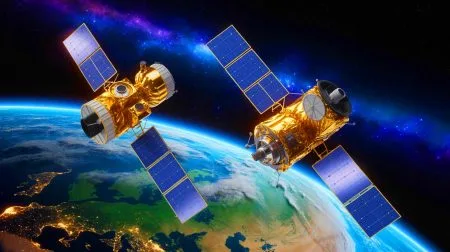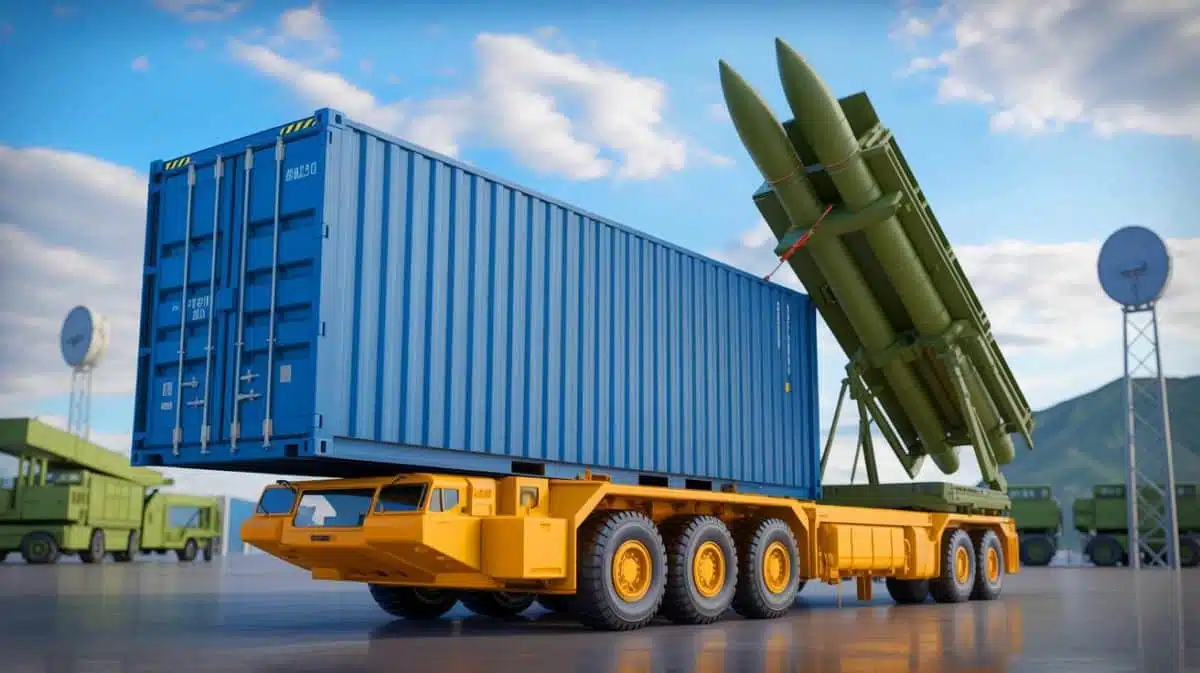| IN A NUTSHELL |
|
In a remarkable leap forward in military technology, Turkey has unveiled a revolutionary weapons system that redefines conventional warfare strategies. By transforming ordinary shipping containers into covert missile launch platforms, this innovation offers unprecedented flexibility and concealability. Developed by the renowned Turkish defense firm Roketsan, this system was showcased at the IDEF 2025 defense exhibition in Istanbul. Capable of launching six Kara Atmaca missiles with a range of over 250 miles, this development highlights a significant shift towards strategic mobility and camouflage in global military operations.
Missile Launchers Housed in Standard Shipping Containers
The genius of Turkey’s new system lies in its simplicity and effectiveness. By housing missile launchers inside standard 20- or 40-foot shipping containers, the military gains a tactical advantage of surprise and stealth. These containers, indistinguishable from regular commercial cargo, can be transported by truck, train, or ship, providing a versatile and flexible platform for rapid deployment.
This strategic innovation is not entirely new, as countries like China and Russia have explored similar concepts. However, Turkey’s focus on the Kara Atmaca missile adds a unique dimension. Known for its precision targeting and inertial and GPS navigation, the Kara Atmaca is a formidable land-attack and anti-ship cruise missile. Equipped with a high-explosive warhead, it underscores the potential lethality hidden within these seemingly ordinary containers.
The implications of such covert strike capabilities are profound. Military observers suggest that these systems could redefine the rules of engagement, making it challenging for adversaries to anticipate or counteract missile placements.
A Perfect Camouflage
The strategic advantages of concealing missile launchers within civilian-style containers are manifold. By eliminating the need for specialized launch vehicles or fortified silos, Turkey’s system enables rapid and unexpected deployments in remote or contested regions. This capability is particularly valuable for defending strategic waterways and harbors when placed on commercial ships or coastal infrastructure.
The inherent mobility of this system is a significant benefit. Containers can be effortlessly moved across various transport platforms, enhancing operational flexibility and making it difficult for opponents to predict missile placements. This modularity supports dynamic mission planning and complicates preemptive actions by adversaries.
Moreover, the use of camouflage techniques improves operational safety, allowing military assets to remain hidden amidst civilian environments. This approach aligns with contemporary warfare’s emphasis on unpredictability and speed, where the ability to hide in plain sight becomes a critical asset.
30,000-Acre ‘Gothic Fire’ Scorches Military Training Range Near Nevada’s Secretive Area 51
Technological Innovation and Strategic Implications
In an era where satellite surveillance and real-time battlefield intelligence are prevalent, Turkey’s container-based missile system exemplifies a shift towards innovative defense strategies. The ability to conceal military equipment within civilian areas poses both opportunities and challenges, especially regarding potential misuse in peacetime or ambiguous conflict zones.
Despite these concerns, Turkey remains focused on traditional defense methods while embracing flexible tactics. This approach is particularly beneficial for nations with extensive coastlines or maritime threats. As asymmetric and gray zone warfare tactics gain global attention, container-based launchers are poised to become a pivotal component of modern defense planning.
By integrating advanced technology with strategic foresight, Turkey’s innovation contributes significantly to the evolving landscape of military capabilities, offering a model for other nations to consider in their defense strategies.
Global Military Dynamics and Future Prospects
The introduction of container-based missile systems marks a new chapter in global military dynamics. As warfare becomes increasingly unpredictable, the ability to deploy rapidly and remain undetected offers a strategic edge. This innovation raises important questions about the future of military engagements and the role of such technologies in shaping geopolitical landscapes.
As nations grapple with the complexities of modern warfare, the significance of adaptability and concealment cannot be overstated. Turkey’s system, with its emphasis on strategic mobility and camouflage, provides a glimpse into the future of defense planning. The potential for these systems to alter traditional military doctrines invites continued exploration and discussion.
Ultimately, as the world navigates evolving security challenges, how will countries balance technological advancements with ethical considerations in military strategy?
Did you like it? 4.6/5 (21)







Wow, Turkey’s really taking “thinking outside the box” to a whole new level! 📦💥
Isn’t this just another step towards more secretive warfare? Should we be worried?
Thank you for the insightful article! The world of military strategy is truly evolving rapidly.
Wait, so these missile containers can just be on any cargo ship? That’s a scary thought! 😳
Can other countries detect these containers, or are they truly invisible until launched?
I’m curious, how does international law view such covert military innovations?
This is like something out of a spy movie. Turkey might be setting a dangerous precedent. 🎬
Does this mean every container ship could potentially be a threat now? Yikes!